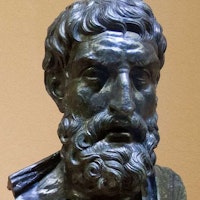When we say, then, that pleasure is the end and the aim… we mean the absence of pain in the body and trouble in the soul.
Epicurus

The Tumult of the Soul
Topic: Self-Cultivation & Health
When we say, then, that pleasure is the end and the aim, we do not mean the pleasures of the prodigal or the pleasure of sensuality, as we are understood to do through ignorance, prejudice, or willful misrepresentation. By pleasure we mean the absence of pain in the body and trouble in the soul. It is not an unbroken succession of drinking bouts and of revelry, not sexual lust, not the enjoyment of fish and other delicacies of a luxurious table, that produces a pleasant life. It is rather sober reasoning, searching out the grounds of choice and avoidance, and banishing those beliefs that lead to the tumult of the soul.
Epicurus, born in February 341 BC on Samos, Greece, became a significant figure in Hellenistic philosophy. Educated under the influence of Anaxagoras, he moved to Athens and later established his own school, "The Garden," focusing on simplicity, friendship, and a life removed from political strife. His philosophy advocated for intellectual over physical pleasures and emphasized a peaceful, self-sufficient existence. Despite being misunderstood during his time, Epicurus's emphasis on happiness and well-being profoundly influenced subsequent thinkers, including Thomas Jefferson.
His philosophy, Epicureanism, prioritizes happiness through ataraxia—peace from fear—and aponia—the absence of pain. Epicurus distinguished between temporary pleasures and the enduring happiness from living without pain or fear. He highlighted the importance of friendship for security and tranquility and advocated for a rational, empirical understanding of the world to overcome irrational fears, especially concerning gods and death, proposing a practical approach to a fulfilling life.
Epicurus's teachings on leading a content life, emphasizing simple pleasures and the value of friendship, have outlived him, remaining influential until the 4th century AD and beyond. Despite being misrepresented, his insights into achieving happiness have left a lasting legacy, guiding many through the centuries towards a contemplative and contented existence. His work invites us to reflect on the nature of happiness and the pursuit of a life marked by intellectual fulfillment and mutual support.
Letter to Menoeceus
Cook, Vincent. “Epicurus - Letter to Menoeceus.” Epicurus & Epicurean Philosophy, www.epicurus.net/en/menoeceus.html, [Epicurus, Letter to Menoeceus].

Epicurus

Epicurus
Resources
Related Quotes
Copyright © 2017 – 2025 LuminaryQuotes.com About Us